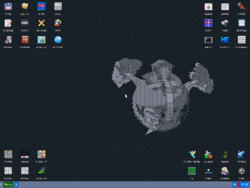Main Page: Difference between revisions
Jump to navigation
Jump to search
No edit summary |
No edit summary |
||
| Line 44: | Line 44: | ||
* Boots from several devices, [http://en.wikipedia.org/wiki/NTFS NTFS] is also supported. You can even start it from [http://en.wikipedia.org/wiki/Windows Windows] (Windows will shutdown). | * Boots from several devices, [http://en.wikipedia.org/wiki/NTFS NTFS] is also supported. You can even start it from [http://en.wikipedia.org/wiki/Windows Windows] (Windows will shutdown). | ||
* Graphical user interface based on [http://en.wikipedia.org/wiki/VESA VESA]. | * Graphical user interface based on [http://en.wikipedia.org/wiki/VESA VESA]. | ||
* Requires only 8 Mb of RAM. (Some versions will boot with as little as 6 Mb) | * Requires only 8 Mb of RAM. <!-- (Some versions will boot with as little as 6 Mb)--> | ||
* Development kit: code editor with a macro-assembler ([http://en.wikipedia.org/wiki/FASM FASM]) integrated. | * Development kit: code editor with a macro-assembler ([http://en.wikipedia.org/wiki/FASM FASM]) integrated. | ||
<!--* TCP/IP stack.--> | <!--* TCP/IP stack.--> | ||
* Runs on low end systems or older hardware | * Runs on low end systems or older hardware [[SystemRequirements|(system requirements)]]. | ||
* Pre-emptive multitasking, streams, parallel execution of system calls. | * Pre-emptive multitasking, streams, parallel execution of system calls. | ||
* Supported file systems are [http://en.wikipedia.org/wiki/FAT12 FAT12], [http://en.wikipedia.org/wiki/FAT16 FAT16], [http://en.wikipedia.org/wiki/FAT32 FAT32] (long names support), [http://en.wikipedia.org/wiki/NTFS NTFS] (partially, read only), [http://en.wikipedia.org/wiki/Ext2 ext2]/[http://en.wikipedia.org/wiki/Ext3 ext3]/[http://en.wikipedia.org/wiki/Ext4 ext4] (partially, read only) and CDFS. | * Supported file systems are [http://en.wikipedia.org/wiki/FAT12 FAT12], [http://en.wikipedia.org/wiki/FAT16 FAT16], [http://en.wikipedia.org/wiki/FAT32 FAT32] (long names support), [http://en.wikipedia.org/wiki/NTFS NTFS] (partially, read only), [http://en.wikipedia.org/wiki/Ext2 ext2]/[http://en.wikipedia.org/wiki/Ext3 ext3]/[http://en.wikipedia.org/wiki/Ext4 ext4] (partially, read only) and CDFS. | ||
* | * Drivers for popular sound, network and graphics cards [[Hardware_Support|(supported hardware)]]. | ||
<!--* [http://en.wikipedia.org/wiki/CD CD] and [http://en.wikipedia.org/wiki/DVD DVD] support. | <!--* [http://en.wikipedia.org/wiki/CD CD] and [http://en.wikipedia.org/wiki/DVD DVD] support. | ||
* User can change [http://en.wikipedia.org/wiki/Theme_(computing) themes] directly in [http://en.wikipedia.org/wiki/Operating_system OS].--> | * User can change [http://en.wikipedia.org/wiki/Theme_(computing) themes] directly in [http://en.wikipedia.org/wiki/Operating_system OS].--> | ||
Revision as of 18:53, 18 March 2013
| KolibriOS | |
Error creating thumbnail: Unable to save thumbnail to destination
| |
 KolibriOS desktop | |
| Website: | www.kolibrios.org |
| Developed by: | KolibriOS Project Team |
| License: | GPL |
| Kernel type: | Monolithic kernel |
| Working state: | Active |
KolibriOS is an open source operating system with a monolithic preemptive kernel, video drivers, for 32-bit x86 architecture computers, developed and maintained by The KolibriOS Project Team. KolibriOS is a fork of MenuetOS, written entirely in FASM (assembly language). However, C, C++, Free Pascal, Forth, among other high-level languages and compilers, can also be used in user application development.
English, Russian and Italian versions are available.
| Home | FAQ |
|---|---|
| Forum | Documentation |
| Nightly builds | Wanted Features |
| Bug tracker | Changelog |
| Source Repository | Applications |
| Developers File Repository | All categories of the wiki |
KolibriOS Features
- Boots from several devices, NTFS is also supported. You can even start it from Windows (Windows will shutdown).
- Graphical user interface based on VESA.
- Requires only 8 Mb of RAM.
- Development kit: code editor with a macro-assembler (FASM) integrated.
- Runs on low end systems or older hardware (system requirements).
- Pre-emptive multitasking, streams, parallel execution of system calls.
- Supported file systems are FAT12, FAT16, FAT32 (long names support), NTFS (partially, read only), ext2/ext3/ext4 (partially, read only) and CDFS.
- Drivers for popular sound, network and graphics cards (supported hardware).
Branches